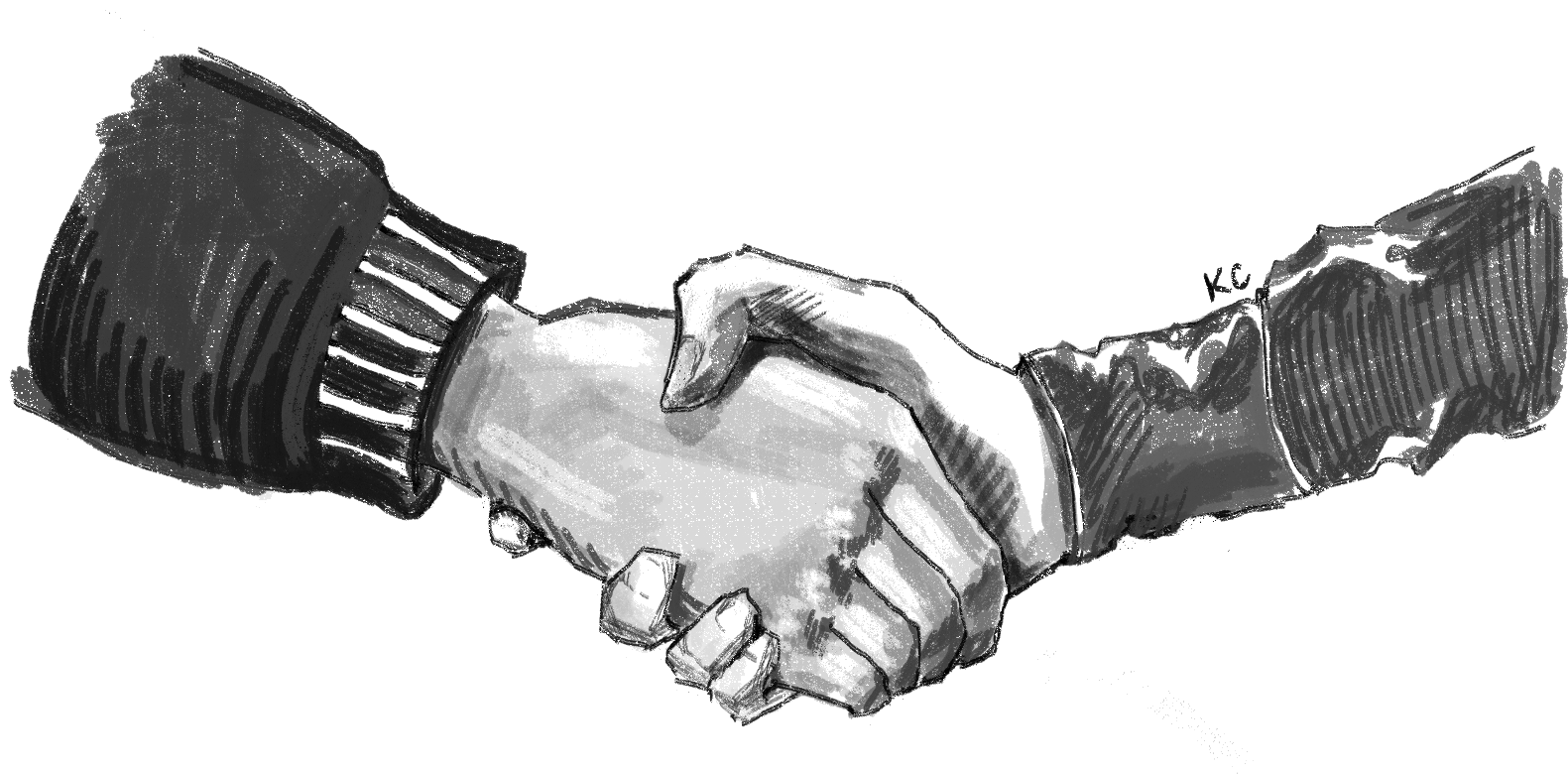
Keyi Cui
Time stands still. It is a moment you’ll relive for days to come, with cringe enveloping your whole self. Your balled fist careens toward your friend’s outstretched palm, a simple misunderstanding with disastrous results. The result is, of course, the “Turkey.” It is the horrible beast that is formed when an attempt at fist-bumping meets a high-five. You lock eyes with your accomplice, before quickly looking away. How has such a simple form of human interaction become so complicated?
It all started with the handshake, the tried-and-true greeting. When you were younger, adults would laud you for a firm handshake with eye contact. You honestly didn’t have any idea what you were doing, but hey, at least you didn’t break Grandpa Dick’s hand. You felt powerful, striding forward to clasp hands with strangers when introduced by your parents in order to hone your skill. Were there tribulations? Why, of course. There was that time 12-year-old you experimented with an exceptionally lengthy handshake at Dad’s office and made Denise, his assistant, mildly uncomfortable before your father nervously laughed and said, “Just take it easy, buddy!”
Ah, but soon came the end of your handshaking days. You made it to high school, and all of a sudden kids were dubbing you “The Weird Kid Who Shakes Hands.” It stung, sure, but you evolved. Watching closely, you saw how the fellow preteens interacted. Maybe you gave hugging a try, but soon that became even creepier than handshakes. It was just too forward for some, but that was fine. Getting maced in the eyes is not your idea of a good time. Suburban dads only served to confuse you in this crucial time of change, insisting on fist-bumping with you and exclaiming “Boom!” as your fists collided. You realized that was not your speed after debuting it at basketball practice, where your teammates asked, “Who are you, my dad?”
You were beaten down, bruised and confused. A ship adrift on a turbulent sea. Were the other kids thinking about handshakes as much as you? Probably not. You watch sadly as it becomes second nature for your classmates. You realize it is time: time to try to successfully “dap” somebody up. Anxiety takes hold. An unexplored frontier lays before you. Two palms collide, then the fingers retract into a grip. It looks ever so smooth when executed correctly, but you’re unclear on even where to start.
After many utterances of “that was whack, try again,” you finally have conquered the modern greeting. You’re on top of the world, until you dap up Grandpa Dick. “That felt wrong,” you think to yourself. You’re right, it was super wrong. The confused and slightly horrified look that fell over sweet Grandpa Dick’s wrinkled face will haunt you for days. Situational awareness, you realize, is necessary for this type of thing. Sure, the family reunion might be weird for the next couple of years, but at least you learned from the experience.
Now that you’ve become secure in your own hand-greeting ability, you are more aware of the world around you. The tables have turned, and you are now able to view the world around you more clearly. Phenomena like the “salmon” become familiar to you, in which a person simply slaps their limp hand into your palm. You glance down at the cold, almost lifeless hand in your grip and wonder how to proceed. The perpetrator of this cruel predicament eyes you carefully, waiting for your next move. You shake the hand gently and feel quite uneasy. It seems your skills could definitely be worse.
But then you face off against the opposite type of opponent: the “too-firm handshaker.” This person is probably a friend of your father’s who played college football back in the day and never really mastered his inside voice. He’ll come barreling over to you at that holiday party your dad forces you to every year, when you have to wear that sweater that is made out of itchiness in its purest form. You stow your hand at your side, praying your dad can just direct the conversation away from you as you shift toward the tray of deviled eggs. Just as you’re about to reach the sweet, sweet salvation of eggs covered in mustard and mayo, you hear your name. So close, but so far.
You turn, aware of the predicament you’ve found yourself in. Without you realizing it, your hand has begun trembling. Your father beckons you back, robbing you of the safety you felt amidst finger sandwiches and pigs in a blanket. “Uncle” Mike, as he likes to refer to himself despite there being no relation, extends his massive hand, and you reluctantly cede your own, knowledgeable of the hurt to come. All of a sudden, your four knuckles have become one. Tears well in the corners of your eyes as fireworks of pain erupt from your hand. After he finally releases your hand, it feels as if amputation is the logical next step.
A handshake, a motion pivotal to human interaction, has so many layers and intricacies. Going through life traditionally shaking the hands of all you see would be a life unfulfilled. Experiment! Explore! But you should probably stick to fist bumps for now — it’s flu season.
Eamonn Smith | eamonn.smith@yale.edu .







